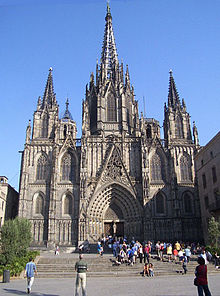Roman Catholic Archdiocese of Barcelona
|
Archdiocese of Barcelona Archidioecesis Barcinonensis Archidiócesis de Barcelona (Spanish) Arxidiòcesi de Barcelona (Catalan) |
|
|---|---|

|
|
| Location | |
| Country | Spain |
| Ecclesiastical province | Barcelona |
| Statistics | |
| Area | 339 km2 (131 sq mi) |
| Population - Total - Catholics |
(as of 2013) 2,661,538 2,119,915 (79.6%) |
| Parishes | 214 |
| Information | |
| Rite | Roman Rite |
| Cathedral | Catedral Basílica Metropolitana de Santa Creu i Santa Eulàlia (Metropolitan Cathedral-Basilica of the Holy Cross and Saint Eulalia) |
| Patron saint | Virgin of Mercy |
| Secular priests | 862 |
| Current leadership | |
| Pope | Francis |
| Metropolitan Archbishop | Juan José Omella Omella |
| Auxiliary Bishops | Sebastián Taltavull Anglada |
| Map | |
 |
|
| Website | |
| Website of the Archdiocese | |
The Archdiocese of Barcelona is a Roman Catholic ecclesiastical territory in northeastern Spain and the metropolitan see of the ecclesiastical province of Barcelona which includes the suffragan dioceses of Sant Feliu de Llobregat and Terrassa.
The current Archbishop of Barcelona is Juan José Omella Omella, appointed by Pope Francis on 6 November 2015.
While local tradition and catalogues date back the first bishop, San Eteri, considered a disciple of Saint James the Great, to the very first Apostles, historical evidence seems to be undisputed from the third century onwards, when bishop Pretextat attended the Council of Sardica in 343. During the Visigothic Kingdom, Barcelona became one of the fourteen dioceses of the ecclesiastic province of Tarragona. After the Christian fall in 712, a long sede vacante was ended not before 850, when bishop Joan took office, and the diocese became subjugated to the Carolingian See of Narbonne.
During the Reconquista, bishop Oleguer was called to the archepiscopal see of Tarragona, which he took in 1017, though being granted to keep his Barcelonan see as well, reigning 1114–1137. Barcelona became suffragan to Tarragona once again, and stayed so for the following centuries. Its bishops got used to live in the pontifical or royal courts instead of the city, until bishop Jaume Caçador inducted reforms according to the Council of Trent amidst the 16th century. Disregarding another year-lasting de facto sede vacante from 1808 to 1814 during the Napoleonic Wars, Barcelona and its diocese kept on grewing richer and more powerful.
...
Wikipedia
